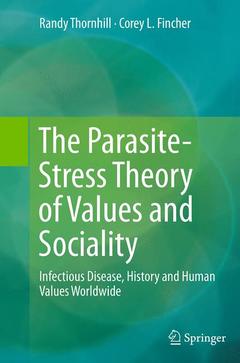The Parasite-Stress Theory of Values and Sociality, Softcover reprint of the original 1st ed. 2014 Infectious Disease, History and Human Values Worldwide
Auteurs : Thornhill Randy, Fincher Corey L.

Builds the revolutionary theory that human evolution is subject to parasite and disease stress that shapes human qualities as personality, political tendencies and propensity toward religiosity
Comprehensive coverage of the topic and its underpinnings and wide scope including value systems, mate choice, political preferences, personality, religiosity and economics
The summation of years of field-defining work by Thornhill and Fincher
Date de parution : 09-2016
Ouvrage de 449 p.
15.5x23.5 cm
Date de parution : 08-2014
Ouvrage de 449 p.
15.5x23.5 cm
Thèmes de The Parasite-Stress Theory of Values and Sociality :
Mots-clés :
Biodiversity; Collectivism; Human Values; Religiosity; Social Psychology; disease ecology



